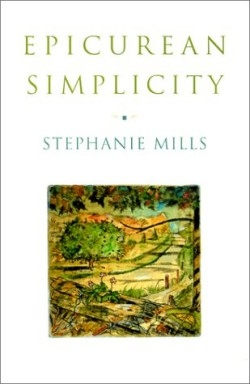Epicurean Simplicity
“A source of bad conscience” says the author, “is the knowledge that my way of life, austere though it may appear to the richer folk, is still ruinously exploitive of nature.” This is food for thought for anyone considering the state of the earth, or wanting to simplify a life lived at breakneck speed amid complications too numerous to count. In this rich, compelling commentary, Mills, whose own lifestyle is far simpler than today’s norm, makes many telling points in her view of life as she lives it and as the rest of the world knows it.
Mills, a land preservation advocate and author of In Praise of Nature and Turning Away from Technology, offers a thoughtful introduction to a philosopher few know today, except as an adjective denoting high living. Epicurus, she explains, was neither gourmand nor hedonist. Rather, his bad name came in part from early church fathers scandalized at his view that life, to be good, must acknowledge the pleasures of the senses. He did not advocate glutting those senses, instead urging his followers to appreciate and savor the moment and the sensation at hand. According to Mills and her cited research, Epicurus is thus the perfect patron for a simple life that appreciates nature and treads more lightly on the earth.
A lighter step is necessary, says this long-time ecological writer; the current drive to consume will destroy the earth. Mills’s views on modern consumerism are neither preachy nor scolding; instead, they woo the reader through loving, often poignant descriptions of the world in which she lives, on thirty-five wild acres near the Great Lakes. Through her imaginative, evocative prose-an experience to be savored in itself-the reader can almost see “the glistening, pale interior of the tiny frog’s throat, stretched to translucence when calling,” or “twigs and branches coruscating with sequins of frost” on a cross-country skiing expedition for one. Through vignettes of a year in Mills’s life, the reader can appreciate wild pleasures vanishing even as the words are read.
Deft comparisons of the “consumer” way of life versus the paucity in the lives of most of the world’s population drive home her point that a simple appreciation of gifts already received would go far toward reducing the strain on the earth’s resources, and toward diluting resentment felt toward “haves” by “have-nots.” The message is both timely and urgent, and deserves to be heard in all its richness.
Disclosure: This article is not an endorsement, but a review. The publisher of this book provided free copies of the book to have their book reviewed by a professional reviewer. No fee was paid by the publisher for this review. Foreword Reviews only recommends books that we love. Foreword Magazine, Inc. is disclosing this in accordance with the Federal Trade Commission’s 16 CFR, Part 255.

